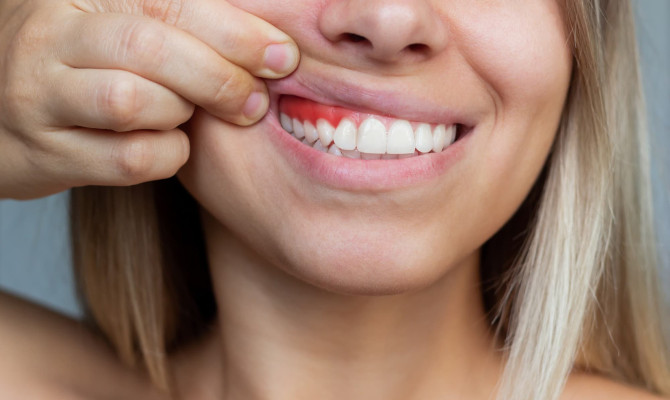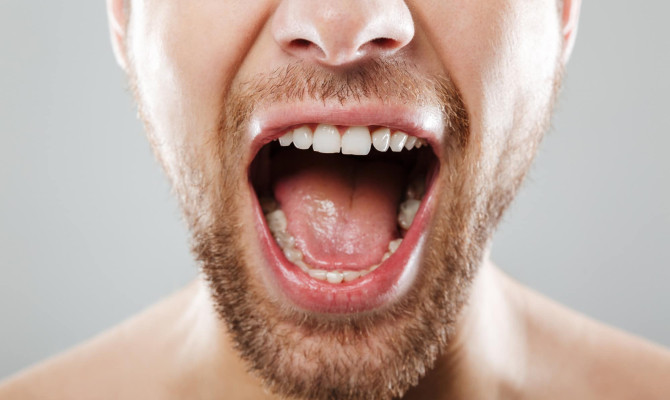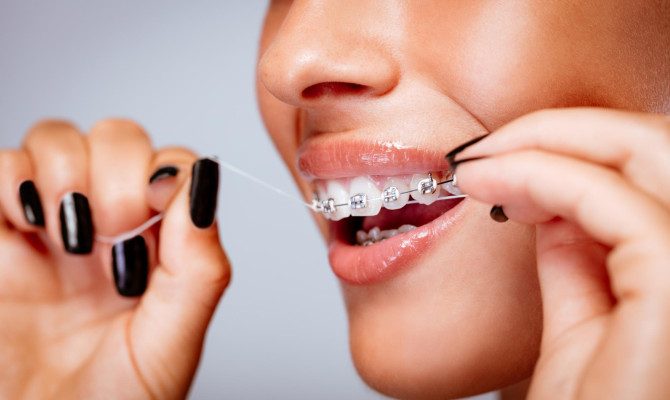Swollen Gums With Braces : What To Do?

- Dental braces
- 25 Sep 2023
Introduction
Swollen Gums With Braces
For a straight and healthy smile, braces are a popular and efficient orthodontic therapy. Your teeth are gradually moved into the desired locations while they walk by applying pressure to them. They offer numerous benefits they can sometimes come with an unexpected side effect: swollen gums.1 Introduction | Researched based study from National Institutes of Health

Swollen gums with braces can be uncomfortable and concerning for those undergoing the treatment. In this article we will explore the causes of swollen gums when wearing braces, the symptoms to watch out for and most importantly how to prevent and manage this issue effectively. Whether you are currently wearing braces are considering them as a treatment option, understanding the potential challenges and solutions related to swollen gums is essential for maintaining both your oral health and comfort throughout the orthodontic journey.
Symptoms

Symptoms of Swollen Gums With Braces
- Pain and discomfort
- Bleeding gums
- Redness and inflammation
- Puffy or enlarged gums
- Pain and discomfort
Swollen gums can be painful and uncomfortable making it challenging to eat, speak or even where your braces comfortably. The pressure from braces components such as wires and brackets can contribute to this.
Redness and inflammation
- They often appear red and inflamed. This is a sign of irritation and can be a result of the constant contact between braces and gum tissue.
Bleeding gums
- Swollen gums are more susceptible to bleeding especially when you brush or floss your teeth. If good dental hygiene practices are not followed, gingivitis, a minor form of gum disease, may develop as a result.
Puffy or enlarged gums
- Swelling can cause your gums to appear puffy or enlarged. This can affect the aesthetics of your smile and may cause additional discomfort when the swollen gum tissue pushes against the braces 1 Symptoms | Researched based study from National Institutes of Health .
Causes
Why are My Gums Swollen With Braces?
- Irritation from brackets and wires
- Poor oral hygiene
- Allergies to orthodontic materials
- Other contributing factors
The primary reasons for swollen gums with braces have been determined by you. Let’s develop a bit deeper into each one of them:
Irritation from brackets and wires
- The brackets and wires of braces can create friction and pressure against the sensitive gum tissue. Continuous contact can lead to irritation and eventually result in swollen gums. Orthodontic adjustments are using orthodontic wax to cover sharp edges can help reduce this irritation.
Poor oral hygiene
- Maintaining proper oral hygiene is crucial. they create more spaces for food particles and plug to accumulate, and if not cleaned thoroughly this can lead to inflammation and swelling. Regular brushing and flossing, use using interdental brushes or a water flosser are essential for preventing this cause.
Allergies to orthodontic materials
- Some people may develop allergies or sensitivities to the materials used such as Nickel or latex. It is crucial to disclose any known allergies with your orthodontist before getting braces since allergic reactions can cause swollen gums.5Orthodontic Materials Allergy | Researched based study from National Institutes of Health
Additional contributing elements
- Other things that may affect it include hormonal changes, illnesses like diabetes, drugs, or smoking. These factors can exacerbate gums sensitivity and swelling, making it more important to inform your orthodontist of any relevant medical history or lifestyle habits. 2Causes | Researched based study from National Institutes of Health , [3],[4]
Treatment
Treating Swollen Gums from Braces
- Orthodontic adjustments
- Prescription medications
- Dental cleaning and scaling
Professional treatment options can be crucial in addressing swollen gums when you have braces. Here is more information on each of these treatment approaches:
Orthodontic adjustments
- Your orthodontist can make adjustments to your braces such as modifying the wires are brackets to reduce friction and pressure. These aim to elevate irritation and discomfort which can help in reducing swelling. It’s essential to communicate any discomfort with your orthodontist as timely adjustments can make a significant difference in your comfort.
Prescription medications
- In some situations, you could be given prescription drugs to treat the symptoms. These could include topical gels or oral antibiotics to reduce inflammation or treat any underlying infections. When using prescription medications, always abide by the directions given to you by your healthcare professional.
Scaling and cleaning of the teeth
- During the course of the treatment, routine dental exams and cleanings are important. Your dentist can perform of professional dental cleanings and scaling to remove plaque and tartar buildup which can contribute to swelling. These are essential for maintaining hygiene and gum health throughout your treatment.5Orthodontic Materials Allergy | Researched based study from National Institutes of Health
Home Remedy
Home Remedies for Swollen Gums With Braces
- Proper oral hygiene
- Saltwater rinse
- Cold compress
- Over the counter pain relief
Preventing and managing braces involves a combination of proper oral care and home remedies. Here is more information on each of these prevention and home remedy methods:
Proper oral hygiene
- Maintaining excellent oral hygiene is the cornerstone of preventing swollen gums with braces. Use fluoride toothpaste and a soft-bristled toothbrush to brush your teeth after each meal. Cleaning the area around the brackets and wires with special care. To get rid of food particles and black that have become stuck in small areas, use interdental brushes.
Saltwater rinse
- It can help soothe and reduce gum inflammation. As a mouthwash, combine a teaspoon of salt with a glass of warm water. For about 30 seconds, gently swish it around in your mouth before spitting it out. It should be done a few times every day to ease discomfort.
Cold compress
- Applying a cold compress can provide temporary relief from pain and inflammation. Use a clean cloth or ice pack wrapped in a thin towel and applied to the outside of your cheek for 15 to 20 minutes at a time. be sure to take breaks to avoid frostbite.
Over the counter pain relief
- Ibuprofen or paracetamol, two common painkillers, can help manage the pain that comes with it. Follow the recommended dosage instructions and dentist if you have any concerns about medication use.5Orthodontic Materials Allergy | Researched based study from National Institutes of Health ,6Treatment & Home Remedies| Researched based study from National Institutes of Health
Help
When to Seek Professional Help?
Knowing when to seek professional help for swollen gums with braces is crucial for your oral health and comfort. Here are the key points to consider:
Severe pain
- If you experience severe and persistent pain that over the counter pain relievers cannot alleviate, it’s time to consult your dentist. This could be a sign of an underlying issue that needs attention.
Excessive bleeding
- If your gums bleed excessively especially during routine oral care like brushing and flossing it could indicate gum inflammation or even gingivitis. Your dental professional can access and recommend appropriate treatment.
Prolonged swelling
- If the swelling in your gums persists or versions despite home remedies and adjustments to your braces, it is a sign that there may be an issue requiring professional evaluation. 1 Symptoms | Researched based study from National Institutes of Health , [4]
Early Care
Importance of Timely Intervention
To avoid bigger issues during treatment, prompt action is essential. Here is why it is essential:
Preventing complications
- Addressing early signs can prevent them from progressing into more severe issues like gum disease or infection which may lead to prolonged discomfort and treatment delays.
Optimizing treatment
- Timely intervention ensures that your treatment progresses smoothly. Unresolved gum issues can hinder the effectiveness of your braces and potential free extended treatment time.
Maintaining comfort
- It allows you to manage any discomfort and pain associated enhancing your overall or orthodontic experience.1 Symptoms | Researched based study from National Institutes of Health
FAQs
FAQs about Swollen Gums With Braces
Is swelling of the gums when wearing braces normal?
- Yes, it is relatively normal for this to happen when you have braces especially during the initial stages of treatment or after orthodontic adjustments. While some degree of swelling is common it is essential to differentiate between normal, temporary and persistent or severe swelling..1 Symptoms | Researched based study from National Institutes of Health , [3]
Do swollen gums go back to normal after braces?
- Yes, in many cases they tend to return to their normal state after the treatment is completed or when they are removed. Once the braces are removed the constant friction and pressure on your gums is one of the primary factors that allow them to return to the normal healthy state.
- With braces removed clean your teeth and gums effectively. Also once the treatment is complete the orthodontic adjustments are no longer necessary which is also a reason for swelling of the gums.
Why are my gums touching my braces?
- Gums touching your braces is a relatively common occurrence during treatment. During orthodontic adjustments it might cause your bumps to come into contact with the braces components more than usual leading to discomfort or irritation. Some teeth shift in a way that brings the gums closer to the braces.
Does salt water help swollen gums?
- Yes, it can be helpful in soothing and reducing swollen gums. saltwater has natural anti-inflammatory properties. when you use a saltwater rings it can help reduce inflammation which is a common cause. It can act as a mild antiseptic helping to clean the mouth and reduce the presence of harmful bacteria. This can be beneficial if it is related to an underlying infection or poor oral hygiene.
Any feedback on this article?
 This Articles content was accurate
This Articles content was accurate Very Informative Article
Very Informative Article I have a question or a comment
I have a question or a comment
 This article contains inaccurate content
This article contains inaccurate content This article was not helpful
This article was not helpful I have a question or a comment
I have a question or a comment
We appreciate your helpful feedback!
Checkout our social pages
References
-
National Institutes of Health
Introduction, symptoms
-
National Institutes of Health
Causes
- National Institutes of Health
- National Institutes of Health
-
National Institutes of Health
Orthodontic Materials Allergy
-
National Institutes of Health
Treatment and home remedies




































